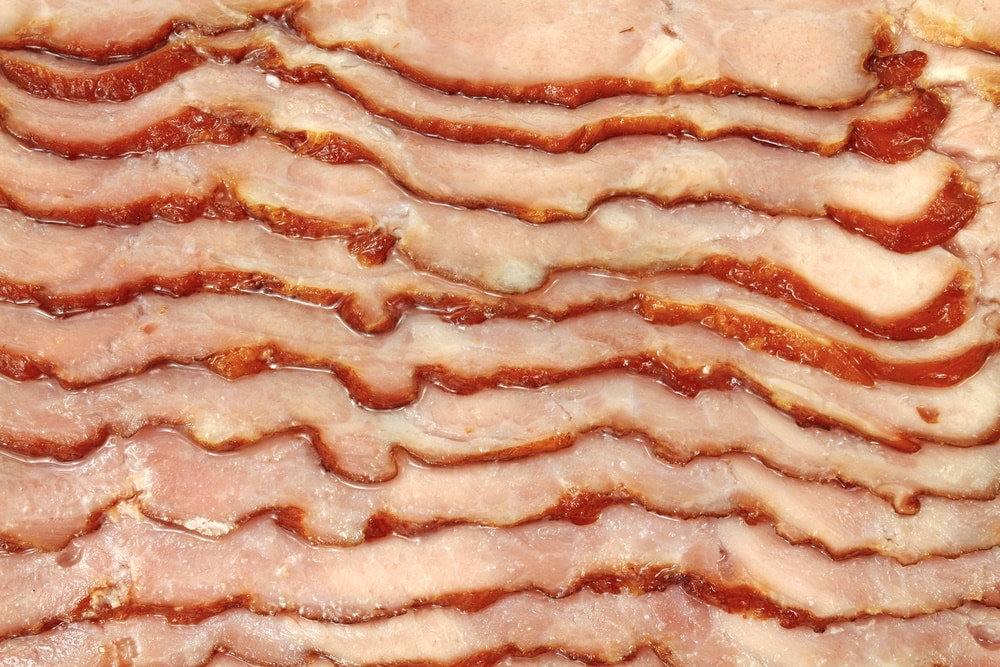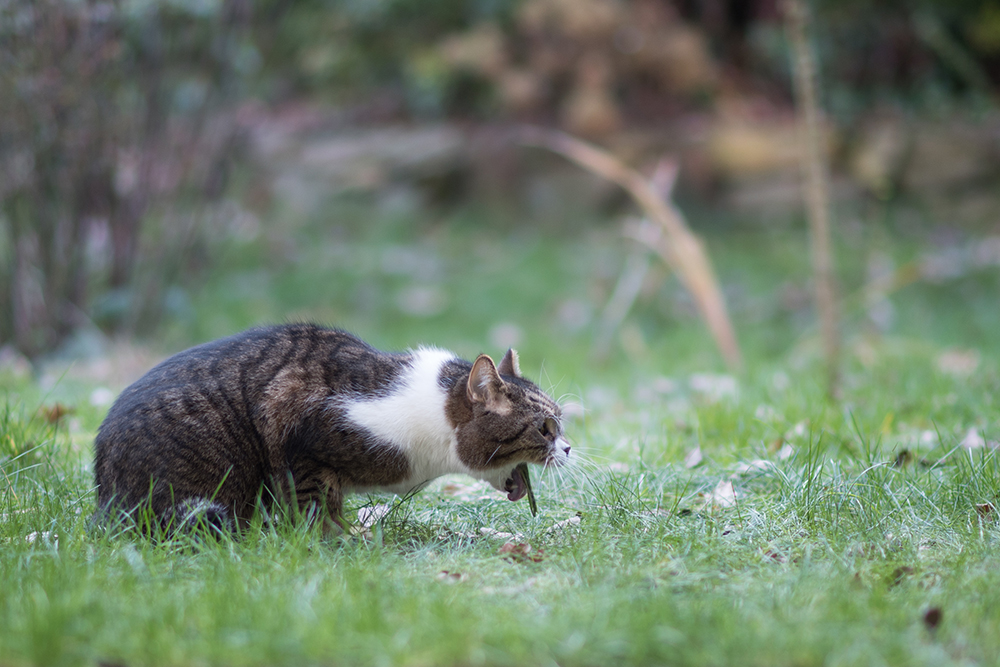Turkey and bacon are two legitimate meats in their own right, and each of these meats is popular with both humans and pets alike—even if our pets shouldn’t be eating them. Cats are known as obligate carnivores, meaning they must eat meat and cannot be vegetarian or vegan. Turkey is a healthy and lean poultry meat that has been used in feline diets and snacks for decades. Turkey is also cheaper than some other meats, contains good levels of protein, and is often gentler and easier for the gastrointestinal system to digest.
Traditional bacon, on the other hand, is a much-loved food and treat, with no signs of its popularity decreasing. Really, who can resist the distinct smell while it’s cooking? So, when turkey bacon came along, it’s understandable to think that one has the best of both worlds. But is that true? And can your cat eat turkey bacon? Unfortunately, turkey bacon is one of those gray areas. While turkey bacon isn’t toxic to cats, it ultimately is best to avoid feeding it to your cat for several reasons.
As cat owners, we want to give our furry friends tasty treats that will make them happy. When we’re cooking up some turkey bacon for ourselves, it’s natural to wonder – can cats eat turkey bacon too?
While turkey bacon may look appealing, it’s important to weigh the potential risks and benefits before sharing it with kitty. In this article, we’ll explore whether cats can eat turkey bacon, the health impacts, and safer treat alternatives to try instead.
What is Turkey Bacon Exactly?
Turkey bacon is a processed meat product made by forming a blend of both white and dark turkey meats into strips to resemble traditional pork bacon. To give it that classic bacon flavor, turkey bacon is seasoned, cured, smoked, and sodium nitrite is often added as a preservative.
The result is a lower calorie lower fat alternative to regular bacon but one that is still high in sodium. Turkey bacon provides a salty, smoky taste that many humans find irresistible. But is it a wise treat option for our feline friends? Let’s find out.
Can Cats Eat Turkey Bacon?
According to most veterinarians, turkey bacon should be avoided as a regular treat for cats. Here are some of the potential risks of feeding turkey bacon to cats:
-
High Sodium Content: Turkey bacon is very high in sodium, containing over 700mg per 100g. Too much salt can cause dehydration or exacerbate kidney issues.
-
Nitrite Preservatives: Sodium nitrite is commonly used in processed meats like turkey bacon. While regulated for humans, even small amounts may be toxic to cats.
-
High in Fat: The fat content in turkey bacon is lower than pork bacon but still very high for cats at around 11g per 100g. Too much dietary fat can lead to obesity and other health problems.
-
Heavily Processed: As a heavily processed human food, turkey bacon contains many additives cats don’t need like sugar, artificial flavors, and extra preservatives.
Health Risks of Feeding Cats Turkey Bacon
While the occasional nibble of turkey bacon may not cause immediate harm, regularly feeding it to cats can pose some health hazards including:
-
Dehydration: The high salt content can disrupt fluid balance and cause dehydration, especially in cats with kidney disease. Watch for increased thirst and urination.
-
Digestive Upset: Too much fat or spices may upset your cat’s stomach, causing vomiting, diarrhea, or cramping.
-
Pancreatitis: The high fat content also puts cats at risk of developing painful pancreatitis inflammation.
-
Obesity: Turkey bacon offers unnecessary calories and fat that lead to weight gain, obesity, and related illnesses.
-
Heart Disease: Excess sodium can cause hypertension and strain the heart. Obese cats are also prone to heart disease.
If you notice any signs of illness after feeding turkey bacon, stop giving it and contact your vet right away.
Healthier Meat Treats for Cats
The good news is there are much healthier meat treats to give your feline friend instead of turkey bacon:
-
Plain Cooked Turkey: Lean turkey breast meat makes an excellent low-fat protein treat.
-
Chicken Breast: Also low-fat and nutritious. Opt for baked or boiled, not fried.
-
Tuna: Canned tuna packed in water makes a tasty cat treat. Limit intake due to mercury concerns.
-
Beef, Lamb, Pork: Unseasoned, cooked red meats offer great protein as an occasional treat.
-
Commercial Cat Treats: Look for low-fat, single protein treats without fillers or additives.
Talk to your vet about the best portion size and frequency of meat treats for your cat based on their health, weight, and activity level.
Can Cats Eat Other Types of Bacon?
The same concerns apply to most other types of bacon:
-
Pork Bacon: Even worse than turkey bacon due to very high fat and salt content. Never feed to cats.
-
Beef Bacon: Also has more fat than turkey bacon, so should be avoided.
-
Vegetarian Bacon: Not toxic but provides no nutrition for obligate carnivores like cats.
The bottom line is all varieties of bacon are best kept away from cats as anything beyond the occasional nibble or lick can pose health risks.
Signs Your Cat May Have Eaten Too Much Turkey Bacon
Hopefully your cat never manages to grab too much turkey bacon, but if they do, watch for these symptoms of dietary indiscretion or sodium ion poisoning:
- Vomiting or diarrhea
- Loss of appetite
- Lethargy or weakness
- Excessive thirst and urination
- Dehydration
- Muscle tremors or seizures
If you suspect your cat has eaten too much turkey bacon, contact your vet or an emergency animal hospital right away for proper treatment.
Smart Ways to Indulge Your Cat
Want to give your cat a delicious, irresistible treat? Here are some healthier ideas:
- Catnip or catgrass for nibbling
- Freeze-dried meat or fish treats
- Meat baby food or broths
- Whiskas Temptations cat treats
- Tiny pieces of boiled chicken or fish
You can also use very small amounts of turkey bacon crumbled up as a flavor enhancer over their regular cat food occasionally. Just be sure to monitor portion size.
The Verdict on Cats and Turkey Bacon
While turkey bacon won’t cause immediate toxicity if consumed in small amounts, it provides no nutritional benefits for cats. The best practice is to avoid making turkey bacon a regular feline treat.
For a healthy, happy cat, stick with high protein, low-fat meat treats like plain cooked turkey or chicken with limited added spices or preservatives. And be sure to keep bacon safely out of paw’s reach during those family breakfasts!

What Is Turkey Bacon?
Turkey bacon is a widely available processed meat made up of light and dark turkey meats, which are then seasoned like bacon and pressed into bacon form. Turkey bacon is thought to be a healthier option than pork and pork bacon due to the lower calorie and fat content. Furthermore, not only is it a very processed food containing added sugar and preservatives, but this meat is also very high in sodium (salt).

Can Cats Eat Turkey Bacon?
Regular turkey meat is a great and healthy meat to offer your cat as a treat (as long as they are not allergic to it) or as the flavor of the main diet—turkey bacon, not so much.
Turkey bacon might be desired by your kitty, and it’s true that it isn’t toxic or poisonous to cats. However, the problem with it is that turkey bacon is an unhealthy snack and meat to give to them.
Turkey bacon is known for its salty taste; in fact 100g of turkey bacon contains 714 mg of sodium. Potentially, and especially if it is fed regularly or in abundance, feeding your cat this processed meat can lead to some dehydration due to all the salt. While it takes a lot of salt to cause health concerns in a healthy cat, cats with kidney disease may not be able to tolerate all the salt. Cats get enough salt in their cat food, so any extra is usually excreted as waste.
Sodium nitrite is a preservative contained in turkey bacon, it is used in pet food in low concentrations determined by law and Association of American Feed Control Officials (AAFCO) guidelines. While the amount in turkey bacon is regulated to human standards, cats are small and the exact amount you are feeding your cat is hard to determine, but could be around 0.012% 1. Sodium nitrite has been linked to the death of three cats, so it’s best to exercise caution with human products containing nitrites 2.

The calories, fat and sugar in turkey bacon could lead to unwanted weight gain over time. Overweight cats are more likely to suffer with joint disease, diabetes, urinary issues, heart disease, hypertension and even cancer.
Due to the associated disadvantages with turkey bacon, it is best not to feed it to cats and to opt for one of the many other alternatives instead, even though trying to ignore your cat’s longing face and paw taps for a piece of the tasty meat might be hard to resist!
If your cat has eaten or is eating turkey bacon and displays any of the following signs, stop feeding the meat and contact your veterinarian for advice.
- Diarrhea
- Vomiting
- Nausea
- Pain/discomfort
- Bloating
- Gas
- Gurgling guts/extra noisy tummy
Can cats eat uncooked turkey bacon?
FAQ
Can you give turkey bacon to cats?
Is it okay to give cats bacon?
Is turkey meat OK for cats?
How much bacon is too much for a cat?
Can cats eat bacon?
While the sodium and fat make bacon delicious, it might spell trouble for kitty. When fewer than 10 percent of your kitty’s daily diet can come from treats, you have to really be choosy about his indulgences. So while he might swipe at your fork while you’re eating bacon and eggs, you might have to resist his persuasion.
Can cats eat turkey bacon?
Bacon contains preservatives like potassium nitrite and sodium nitrite, which can be harmful to your pet. If you give bacon to your pet regularly, it might lead to an irregular heartbeat. The moral here? Don’t overdo it!
Can dogs eat turkey bacon?
Turkey bacon, for instance, is the healthiest bacon a dog can eat. This is because it is leaner, so it has less fat and also has less sodium. You should still be choosing low sodium cuts of turkey bacon if you mean to feed them to your dog with any sort of regularity.
How often does a cat eat bacon?
How often a cat eats bacon depends on several factors such as age, health, and diet. A piece of bacon once a week is OK for most cats. However, it’s important to remember that bacon is a cured meat and therefore high in sodium. It may also contain additives that are not suitable for pets.
